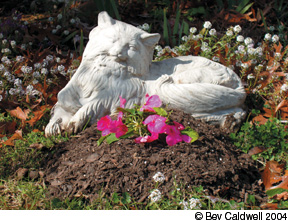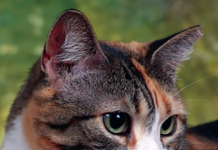For many people, losing a feline member of the family can be traumatic, especially if the cat is ones main source of companionship. Children, the elderly and anyone who has felt that special bond with a cat may grieve in many of the same ways that they may grieve over the loss of a human family member. Almost every client grieves from the loss of a cat, says Drew Weigner, DVM, who is board certified by the American Board of Veterinary Practitioners, but it varies from person to person.
To help in the grieving process, pet owners often look for ways to remember or memorialize their cats. Doing something special helps alleviate the pain of loss and make the cats memory permanent beyond the boundary of his life. Many clients send us pictures, says Dr. Weigner, who keeps an album of pet photos, some twenty years old, in the reception area of his Atlanta, Georgia clinic, The Cat Doctor. The photo album is good for clients when they come back, says Dr. Weigner.
Writing stories about your pet or keeping a journal is another way to memorialize your cat. Writing seems to be a cathartic process for many, and committing anecdotes or stories about a cats life to paper is a good way to heal. Poetry, diaries and essays help you remember the good times and come to terms with your loss. For people who can readily communicate in writing, it can be helpful, says Dr. Weigner.
Other clients may write letters to their cats. Sometimes just being able to express what they felt can be helpful, says James Richards, DVM, editor of CatWatch and director of the Cornell Feline Health Center. Some people may want to help animals by donating in their pets memory to an animal organization or shelter. Simple remembrances – such as buying bricks or stones for animal walkways or cages for shelters – are some ways to contribute to animal causes.
Like many veterinary clinics, The Cat Doctor sends sympathy cards to clients whose cats have died. We also make a donation to the Cornell Feline Health Center Memorial Program, says Dr. Weigner. Many clients are astounded by that. It affects them more than anything else we do.

288
The Cornell Feline Health Center Feline Memorial Program
One of the best ways to memorialize your cat or that of a friend or loved one and to help cats everywhere at the same time is by contributing to the Cornell Feline Health Centers Feline Memorial Program. Contributing to the Feline Memorial Program can provide a valuable way for people to cope with loss, says Dr. Richards. The Feline Memorial Program contributes to the overall budget of the Feline Health Center, a unit of Cornell Universitys College of Veterinary Medicine that is devoted to improving the health and well-being of cats everywhere. Although most donations are made by veterinarians in memory of a clients deceased cat, anyone can contribute, says Dr. Richards. When someone donates to the Feline Memorial Program, a letter is sent to the cats owner acknowledging the gift. The acknowledgment often results in letters and calls from appreciative pet owners who didnt know about the program.
The Memorial Program meets a need for people, says Dr. Richards. They realize that their cats life had meaning beyond what the cat meant to them personally. Once cat owners learn about the program, they often donate in memory of their own cats or the cats of friends. Although contributors can earmark funds for a specific purpose such as cancer research, it is more helpful to donate to the Programs general fund and allow the Feline Health Center to apply the funds where they are most needed. Contributions are tax-deductible. Gifts can be in any amount, and gifts of $100 or more are published in the Honor Roll of the Centers annual report. To make a gift, print out the form from the Feline Health Center web site at www.vet.cornell.edu/flc/resources/memproold.htm and mail it to: Cornell Feline Health Center, College of Veterinary Medicine, Cornell University, Division W3, Ithaca, NY, 14853. For more information, call 607-253-3414 weekdays from 9 a.m. to 4:30 p.m. Eastern Time.
Other Feline Health Center Programs
In addition to the Feline Memorial Program, you can contribute by participating in these programs:
Memberships enable the FHC to disseminate information on feline health and behavior and promote feline health studies. For a personal or gift membership, call 607-253-3093.
Cash gifts provide financial resources to fund efforts to prevent and cure feline diseases. Your employer may provide matching funds.
Planned gifts provide financial resources for the Centers future while providing you with tax benefits. If you would like to discuss planned gifts in the form of bequests, life income agreements, trusts or stocks, call 800-481-1865.
The Dr. Louis J. Camuti Memorial Endowment Fund was established in memory of Dr. Camuti, the first veterinarian in the United States to devote his practice to treating cats.
The Camuti Memorial Feline Consultation and Diagnostic Service provides information on feline ailments and treatments to veterinarians, breeders and cat lovers.



